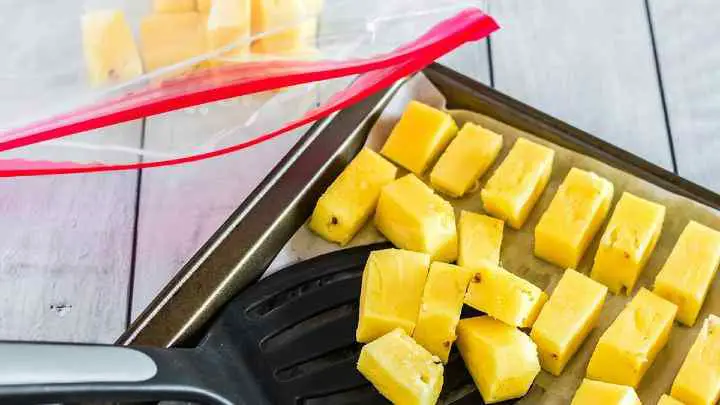Can you freeze pineapple? It’s a question I get asked a lot when I talk to people about freezing fruit.
The answer to this question is yes. Freezing pineapple is an excellent way to preserve this delicious fruit for later use. You can use your frozen pineapple in smoothies or other blended drinks or eat it as it is for a tasty treat.
Read on for more details about freezing pineapple.
What Is a Pineapple?
Pineapple is a tropical fruit from the Bromeliaceae family. It is known by many different names, such as “ananas”, which is French for pineapple.
Pineapples come in a wide variety of shapes and colors and can be eaten raw or cooked. You can use them as an ingredient in savory dishes such as stir-fries, or add them to fruit salads, smoothies, and cocktails.
SEE: Grocery Shopping Tips and Tricks You Need to Know
Can You Freeze Pineapple?
Yes, you can. Freezing pineapple is a great way to prevent the fruit from going bad. It’s also a good way to enjoy this tropical treat all year round without having to buy it fresh every time you want some.
To use frozen pineapple in recipes that call for fresh pineapple, simply thaw it in the refrigerator or at room temperature. Once thawed, you should eat it within 24 hours to avoid spoilage because bacteria may grow in the fruit after thawing.
Why Should You Freeze Pineapple?
First off, freezing pineapple will keep it fresh for longer. The low temperature helps prevent the growth of bacteria or other microorganisms that can cause food spoilage.
Another advantage of freezing pineapple is that it makes for an easy snack option when you’re away from home. Just pop one into the microwave for a few seconds and enjoy.
Freezing pineapple can also be a very economical option if you’re on a tight budget and need to save money where possible. This way, you don’t need to compromise your health by getting rid of other foods like vegetables and meat.
And finally, freezing pineapple helps preserve its flavor and nutrients. This can be especially helpful if you’re going away on holiday and want to keep some of your favorite fruits in the freezer.
SEE: Can You Freeze Gravy Without Ruining It?
How to Freeze Pineapple
- Wash the pineapple. Use a vegetable brush to scrub the outside of the fruit with water and a little bit of rubbing alcohol or soap.
- Cut off the top and bottom of the pineapple, then cut the pineapple in half lengthwise.
- Remove the core and slice the fruit into 1/2-inch pieces. It is best to slice the pineapple before freezing it, as this makes it easier to pack into bags for storage.
- Line a baking sheet with parchment paper or wax paper and place the pineapple slices on top of the paper.
- Place another sheet of parchment paper or wax paper on top of the slices and press down to remove any air bubbles from between the sheets.
- Freeze for 4 hours, then transfer the frozen pineapple to a freezer bag or other container.
- Label the bag and store it in the freezer for up to 4 months.
Thaw your frozen pineapple in the refrigerator overnight, or set it out on your countertop for 30 minutes before serving.
How Long Can You Freeze Pineapple?
The exact storage time depends on how ripe your pineapple is and how you freeze it. In general, pineapple will keep in the freezer for up to 1 year, but it’s best to use it within 6 months of freezing.
SEE: Here’s a Chance to Win a $500 Food Lion Gift Card
Pros of Freezing Pineapple
- Prolonged shelf life: Freezing pineapple is an easy way to prolong the shelf life of your fruit by preventing the growth of bacteria. Freezing also allows you to preserve the pineapple’s flavor, color, and nutritional content.
- You’ll save money: Freezing pineapple allows you to buy in bulk in seasons when pineapples are cheap and at their best. This saves you money because you don’t have to purchase a fresh pineapple every day or week.
- You’ll reduce stress: If you’re like me and don’t like stress, consider freezing your pineapples. This way, when you need to make a smoothie or cocktail, all you have to do is thaw out the fruit and use it as needed.
- You’ll always have it handy: Pineapples can stay fresh in the freezer for up to 1 year, so you’ll always have some on hand. You can use frozen pineapple in smoothies or cocktails, or add it to your favorite recipes.
SEE: Enjoy Discount on Food and Drinks During Happy Hour at Culinary Dropout
Cons of Freezing Pineapple
- You have to wait for a while: To eat frozen pineapple or use it in cooking, you need to thaw it first in the refrigerator or at room temperature. This can take a while (about 30 minutes or more)
- Mushy texture: Freezing can also cause the pineapple’s texture to become mushy. This can be a problem if you want to eat the fruit raw or if you want to use it in a recipe where the texture is important.
FAQs
Is pineapple a healthy fruit?
Yes, it is. Pineapple is a great source of nutrients, such as vitamin C, folate, and potassium. It is also very rich in fiber, which helps you lose weight.
Pineapple is also rich in bromelain, which is an enzyme mixture that can help to relieve sinusitis, indigestion, knee pain, and other health issues.
Can you use frozen pineapple in milkshakes?
Yes, you can. To use frozen pineapple in a milkshake, simply blend it with some milk or yogurt and add other ingredients such as ice cream or whipped cream. This will make a delicious milkshake that is perfect for summer.
In addition, frozen pineapple is good for use in smoothies and beverages, as well as on top of salads or desserts. You can also use it as a topping for ice cream, yogurt, or other frozen desserts.
SEE: Here’s How You Can Freeze Kiwi to Keep Its Quality
Is it bad to freeze fruits?
No, it is not. Freezing fruits is a great way to preserve them for future use. Freezing also preserves the nutritional value of most fruits, keeping them as healthy as they were before freezing.
The process of freezing fruit is simple, but make sure the fruit is ripe and ready to eat before freezing. Also, avoid putting too many fruits in one package, as this may cause their texture to become mushy.
Where are pineapples from?
Pineapples are native to South America, but they are now grown all over the world. You can find them on many different continents, including Europe, Africa, Antarctica, Asia, and North America.
Conclusion
Freezing pineapple is a great way to preserve the fruit. It’s also a great way to save money and make sure you always have some pineapple on hand.
The process is simple; wash and core the fruit, cut it into slices, place the slices on a baking sheet and freeze until solid. Then transfer the frozen pieces to a freezer bag or container and freeze for up to a year.
Thanks for reading.
Did you enjoy this article? Visit Cheffist for more.







